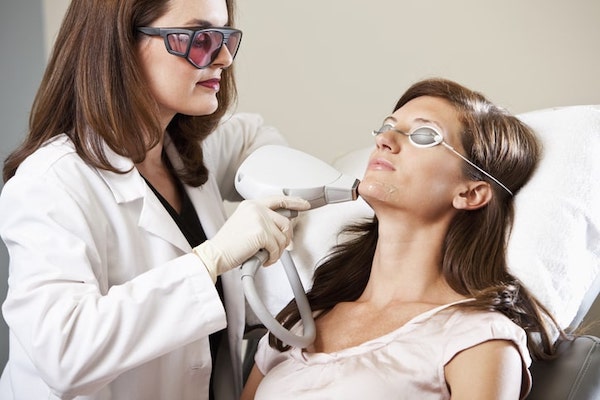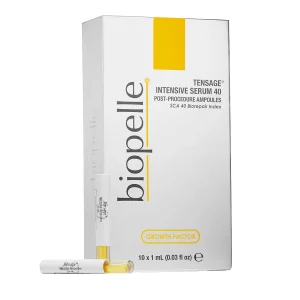Have you ever wanted to erase years from your face? With facial laser treatments, you may be impressed with the outcome.
Laser treatments are procedures that can help you achieve serious skincare results. They’re more powerful than your average facial, but they don’t require injections like some cosmetic procedures. There may be some recovery time involved, but the results can be worth it if you want more youthful-looking skin.
This guide explains how skincare laser treatments work, what kinds of results you can expect and how to achieve optimal results with pre- and post-laser skin care.
What Are Skincare Laser Treatments?
A skincare laser treatment is the use of a laser to apply light and heat on the facial area to treat skincare issues like:
- Wrinkles
- Fine lines
- Scars
- Age spots
The laser can be an ablative (wounding) laser or a non-ablative (non-wounding) laser.
Generally, ablative lasers produce more noticeable results. These types of lasers remove the thin outer layer of the skin called the epidermis. Then the laser heats the next layer of skin, the dermis. That can help stimulate collagen growth and promote skin healing. As your skin repairs itself, it becomes tighter, smoother and more youthful-looking.
With an ablative laser treatment, your doctor may recommend getting a local anesthetic injection or intravenous sedation to stay comfortable during the procedure. Post-procedure, you may experience temporary pain and redness.
A non-ablative laser, like a pulsed-dye laser or intense pulsed light device, pulses the laser light along the skin to stimulate collagen growth and improve skin texture and tone. This type of treatment can help with skin issues like rosacea, acne-related skin concerns and spider veins.
Since a non-ablative laser doesn’t remove the epidermis, you’ll likely have less redness and irritation after this type of treatment. However, the results may not be as noticeable after a single procedure compared to an ablative laser skincare treatment. You may experience a little tenderness in the treatment area after a non-ablative laser procedure.
Always consult a dermatologist on what type of procedure they recommend. Depending on your current skincare state and what your goals are, the best treatment for you may be different than what it’d be for another patient.
Also, certain medications or supplements you’re taking could affect the treatment’s results. Some chronic conditions, such as diabetes, could impact your safety during the treatment, so always discuss treatments with a doctor first.
How Do Skincare Laser Treatments Affect Skin?
People use laser treatments for all types of skincare goals. Laser treatments can help with skincare issues like:
- Aging: According to the American Society for Dermatologic Surgery, laser treatments are effective in removing old skin cells and revealing newer, more youthful cells. That can help decrease the effects of aging and issues like wrinkles and scarring. As the skin’s collagen production is stimulated, that can result in firmer skin and reduced skin sagging.
- Hyperpigmentation: Hyperpigmentation is a term that’s used to describe skin that has turned darker. “Age spots” are a type of hyperpigmentation. Collagen production can also help diminish the appearance of hyperpigmentation and help to smooth out skin tone.
- Estrogen-deficient skin: As we age, and especially after menopause, we produce less estrogen. For the skin, that can result in dryness, thinness and wrinkling that results in the appearance of aging skin. You can use a laser treatment to reverse the effects of estrogen-deficient skin, like wrinkles.
Depending on what you want to use a laser treatment to improve, you may be able to see results in a single ablative laser treatment or in several non-ablative treatments. Talk with your skincare provider about what they recommend.
How to Take Care of Your Skin Pre- & Post-Laser Treatment
Always follow your doctor’s recommendations for how to prepare your skin before a laser treatment and for how to take care of it after one. Ablative laser treatments may require several weeks for full healing, while non-ablative laser treatments generally don’t require downtime.
To prepare for laser skin treatments, the Cleveland Clinic recommends to:
- Use a broad-spectrum sunscreen daily for 4 weeks prior to treatment.
- Avoid heavy sun exposure or tanning.
- Avoid deep facial procedures for 4 weeks prior to treatment.
- Don’t use medications that cause photosensitivity for at least 72 hours prior to treatment.
After your laser treatment, your skincare provider will recommend a post-treatment plan. Depending on the type of treatment you get, you may need to have a nonstick dressing on the treatment sites for 24 hours and will have to clean the treated areas with various solutions, ointment or creams until your skin heals. Generally, you’ll be advised not to wear makeup until your skin has healed.
One popular form of post-laser skin care is Tensage Intensive Serum 40. Your dermatologist may recommend Tensage Intensive Serum 40 because it can help to shorten the healing time and optimize the results from your procedure. The Tensage Intensive Serum 40 can reduce redness, improve smoothness and increase luminosity.
Dr. Joel L. Cohen says he recommends Tensage growth factor before procedures in the day and a retinoid like Retriderm Serum Mild. After ablative lasers, he says he recommends Tensage Intensive Serum 40 because “they are literally packed with high-concentration growth factors to try to help with both wound-healing recovery as well as collagen production.”
Learn more about Tensage Intensive Serum 40 and all post-procedure skincare from Biopelle.

